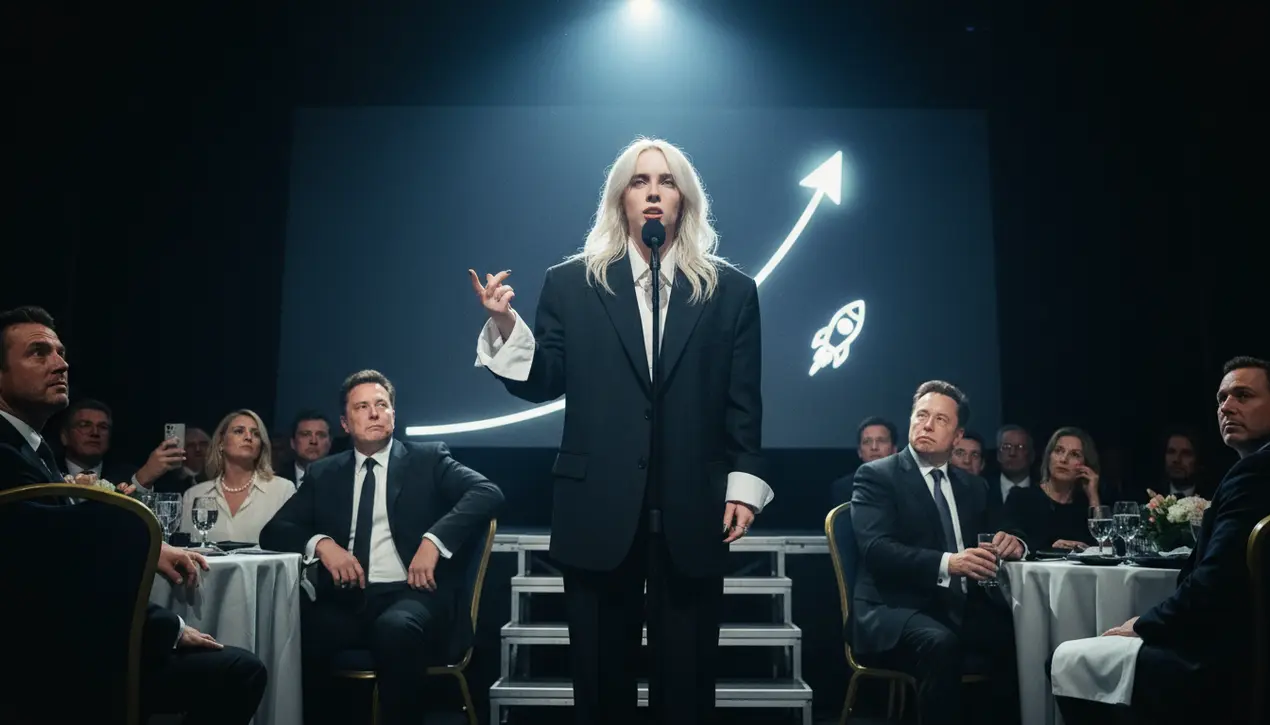
Entertainmentcelebrities
Billie Eilish Criticizes Elon Musk's Prospective Trillionaire Status
AN
Anna Wright
1 hour ago7 min read
In a cultural moment that starkly illustrates the chasm between unprecedented private wealth and pervasive public need, musician Billie Eilish has amplified her critique of the global elite, this time targeting the prospective ascent of Elon Musk to become the world's first trillionaire. This isn't a new refrain for Eilish; just weeks prior, during a Wall Street Journal awards ceremony—a venue itself symbolic of the establishment she critiques—she delivered a characteristically blunt, almost off-the-cuff admonition to the billionaires in attendance: 'Give your money away, shorties.' While her delivery was laced with a Gen Z casualness that belies its serious intent, the message cut to the heart of a deepening global crisis. The world is, by her assessment and that of many economists and sociologists, 'getting scarier and scarier,' a sentiment fueled by a wealth gap that expands not incrementally but exponentially, creating a reality where the prospect of a single individual amassing a trillion dollars exists alongside rampant food insecurity, unaffordable housing, and a destabilizing climate crisis.Eilish’s commentary, therefore, transcends mere celebrity opinion; it acts as a powerful megaphone for a generation increasingly disillusioned with the structural inequalities that allow such concentrated wealth to accumulate. The figure of Musk is particularly potent in this narrative.As the CEO of Tesla and SpaceX, he is often framed as a visionary pioneer, a modern-day industrialist pushing the boundaries of technology and exploration. Yet, this narrative frequently overshadows the labor practices, government subsidies, and market volatilities that underpin his fortune.Eilish’s focus on him personalizes an abstract economic issue, forcing a public conversation about the social contract and the moral responsibilities of those who operate at a scale of wealth that rivals the GDP of small nations. What does it mean for democratic governance and social cohesion when an individual's financial power is so immense? This is not merely a question of redistribution but one of power dynamics and influence.From a feminist and social policy perspective, Eilish’s voice is significant. She represents a shift where young women, often the most affected by austerity and economic disparity, are using their platforms not just for entertainment but for pointed political and economic critique.Her language, unpolished and direct, stands in deliberate contrast to the sanitized, corporate jargon of philanthropy and 'impact investing,' cutting through the noise to demand a more fundamental reckoning. The path to a trillionaire, as forecasted by analysts, is paved by ventures in space, AI, and continued market dominance—realms with minimal regulatory oversight and profound implications for humanity's future. Eilish’s critique forces us to ask: who gets to shape that future? Is it to be a collaborative, democratic process, or will it be dictated by the whims and wallets of a vanishingly small cohort? The tension she highlights is the defining struggle of our time: the conflict between the concentration of astronomical private wealth and the urgent, collective needs of a planet in peril.
#Billie Eilish
#Elon Musk
#wealth gap
#philanthropy
#celebrity activism
#featured
Stay Informed. Act Smarter.
Get weekly highlights, major headlines, and expert insights — then put your knowledge to work in our live prediction markets.
Related News
Comments
Loading comments...
© 2025 Outpoll Service LTD. All rights reserved.